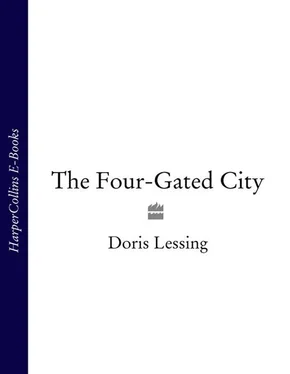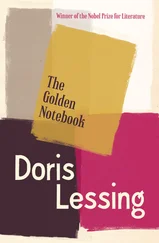‘Who are you?’ he demanded.
‘I work for Mr Coldridge. I do the cleaning.’
She had the key in the door, but she was gripped by her other arm which clutched parcels.
His face was alive with suspicion, but also with the delights of the chase.
‘What’s going on in there?’
‘I work for Mr Coldridge. I do the cleaning.’
The clothes were right, but her voice was not. His face was hard, self-righteous. He was a man seeking to unmask evil. He took five pounds from his pocket. He hesitated. Five pounds was more than enough for a charwoman, but not for a friend or mistress or fellow-conspirator of Mark Coldridge. Hesitating, he lost his force of purpose; Martha slipped her arm away, and shot indoors, scattering parcels on to the floor of the kitchen. Through the back window his face appeared, in an angry teeth-bared scowl. Framed thus, emphasized, it was almost yes, funny. He looked like a bad actor in a melodrama: my prey has escaped.
One of the aspects of a bad time, before one has entered into its spirit, is that everything has a feel of parody, or burlesque. Martha stood in the kitchen, looking at the ugly, threatening face, and had to suppress laughter. Nervous laughter, certainly, and when he shook his fist at her, it was ugly and she was afraid. That evening, among the pile of newspapers that came from the newsagent, brought past the reporters by the newsagent’s boy, was one which carried a story about a mysterious woman, who had entry to Mr Coldridge’s house, and who would not give her name.
Next day was the birthday. In the morning Paul was given presents which he opened. Mark and Martha watching. He tore through them, throwing them aside, one after another: he was looking for evidences of his mother. He had not mentioned his mother for some days. Clearly the birthday had become for him the talisman which could produce his mother. The presents had not, but there was still the party.
After breakfast he went to Mark’s study and stood by the desk watching Mark pretending to work. By now they were waiting for him to ask: Where is my mother, so that they could tell him the truth. Which they should have done before. But the right time had gone past, and they did not know what to do. Everything was wrong, the ‘party’ absurd, the presents a mistake.
But now they did not know how not to have the party.
Martha laid a party-spread on the table in the dining-room. But Paul demanded that it should be in the kitchen. Nothing came in the front door, only sheaves of newspapers, falling through the letter-slot. But the back door could admit. It was through the back door that he expected his mother.
Martha spread out the cake, with its six candles on the kitchen table, and some biscuits and little cakes. While Martha moved about in these pathetic preparations, Paul stood just inside the kitchen door, watching them: Mark, trying to engage Paul’s attention, played with a wooden train on the floor. From time to time the two grown-up people exchanged glances of helplessness, and of shame, because things could have been allowed to reach this point.
There was a heavy knock on the back door; and the little boy, crying ‘There she is! There’s my mummy!’ rushed to open it. Two men stood there. One was the journalist of yesterday, looking angrily sullen. The other was a large smiling man.
‘Where’s my mummy?’ shouted Paul.
The two looked at each other, then studied Martha, arranging cakes, and Mark, playing trains.
The large man said: ‘Take it easy, son, take it easy. Your mummy’s not coming, you know.’
‘Why not, why not?’ screamed Paul, and flung himself down. Lying face down, he banged his head hard on the floor while his face exploded tears.
‘Is this Colin Coldridge’s boy?’ asked the sullen man, bending to examine him for describable details.
Mark now scrambled up off his knees, and advanced on the journalists. Yesterday’s man was suspiciously angry. The large man was smiling, ingratiating. The child continued to bang his head, crying noisily. Mark, with his eyes wide, his mouth open, his face white, appeared comic.
‘Take it easy,’ said the large man again, and backed away, in a parody of fear: he was making fun of Mark.
The self-righteous man was now making mental notes about the kitchen. Having done this, he returned his attention to Paul, who was writhing at his feet, and said accusingly: ‘Why didn’t you tell the boy about his mother?’
At which Paul shot off the floor and grasped his uncle around the knees, so violently that Mark staggered and leaned sideways to catch hold of a chair-back. ‘Tell me what?’ screamed Paul.’ Where’s my mummy?’
‘Your mummy’s …’ The journalist stopped; unable to say ‘dead’ to the child’s face.
With a mutter of inarticulate disgust, he backed out of the door. The goodfellow, smiling deprecatingly, said: ‘Here’s my card.’ He laid a piece of card on the table by the cake. Miles Tangin. The Daily – ‘If you’d co-operate, Mr Coldridge,’ he suggested, ‘then it would be better.’
‘I’ll complain to your editor,’ said Mark over Paul’s head. The child was sobbing noisily, and gripping Mark’s knees, so that Mark had to hold himself upright with one hand on the chair-back while with the other he tried to soothe Paul.
‘You do that,’ said the first man, all contemptuous bitterness.
The two went out together.
Mark carried the sobbing child up to bed.
In bed he was quieter, whimpering a little, while he watched them both. He was waiting.
‘Where’s my mummy?’ he asked at last. Martha said: ‘She’s dead, Paul.’
Paul took it. It was a fact which marched with the events of the last week. ‘And is my daddy dead too?’
‘No,’ said Mark, with emphasis. But both he and Martha knew that of course he would not believe them. They had been lying to him: they were probably lying again.
‘He’s away,’ said Martha. ‘He’ll come back.’
Paul said nothing. He lay staring at them, with his black, untrusting eyes. Then he turned his face to the wall, and shut them out. They stayed with him. Hour after hour passed. He was not asleep. He kept dropping off, but he whimpered in his sleep, and this woke him. It was nearly morning when at last he fell into a deep sleep.
Their days were now spent with Paul, the child who could not trust them. He had gone silent, evasive, listless. He spent hours curled in a chair in the kitchen, sucking his thumb. He usually did not answer when Martha or Mark spoke to him. This did not look as if he were trying to be a baby again, wanting to be fed; but as if he really could not take in the existence of food, of mealtimes. He would sit listening, or apparently listening, if they read to him or told him stories. He sat quietly for the children’s programmes on the radio. Put to bed, he slept. When he looked out of the back windows, the front windows, and saw the groups of reporters waiting there, he examined them, then looked at Mark and Martha for explanations. It seemed he was afraid to ask questions. But they wouldn’t have known how to answer.
In the evenings, the two sat in Mark’s study. Mark’s white face had acquired a staring mask-like look; as if wide-eyed at the incredible, the impossible. He did not believe what was happening. This was because he was Mark Coldridge, to whom such things could not happen.
Yet he was also Mark Coldridge who had written that book about war which came from the heart of an understanding of how such things happened – must happen. Martha was waiting to talk to the man who had written that book: but he was not there.
Mark was saying things like: ‘We must get Paul to school so that he can get over it.’ Or: ‘When it’s blown over, I’ll take Francis and Paul for a holiday somewhere.’
Читать дальше












